 In a major step towards reducing the criminalization of the poor in Rhode Island, the City of Providence has advised the American Civil Liberties Union of Rhode Island that it would halt enforcement of an anti-panhandling ordinance that has led to the harassment and arrest of homeless individuals. The ACLU had called for this action in a letter delivered to Mayor Jorge Elorza two weeks ago, in which it pointed out the ordinance’s dubious constitutionality and its impact on the rights of the poor and the homeless.
In a major step towards reducing the criminalization of the poor in Rhode Island, the City of Providence has advised the American Civil Liberties Union of Rhode Island that it would halt enforcement of an anti-panhandling ordinance that has led to the harassment and arrest of homeless individuals. The ACLU had called for this action in a letter delivered to Mayor Jorge Elorza two weeks ago, in which it pointed out the ordinance’s dubious constitutionality and its impact on the rights of the poor and the homeless.
Advocates for the homeless have been critical of a seemingly aggressive enforcement by the City of laws that target innocuous activity of the homeless in public. In its letter, the ACLU had noted that the City’s ban on so-called “aggressive solicitation” directly targets the homeless, and that a number of similar ordinances have been recently struck down by the courts for infringing on First Amendment rights. The ACLU therefore requested that the City immediately halt its enforcement. In response, the City agreed to that request and also to terminate any pending prosecutions.
“The Mayor remains committed to making Providence a place that supports its residents, especially those who are most in need, and we look forward to our continued work together in this regard,” Providence City Solicitor Jeffrey Dana stated in a letter to the ACLU of RI.
ACLU of Rhode Island executive director Steven Brown said today: “This is a very positive development, and we applaud the City for recognizing that this ordinance cannot withstand constitutional scrutiny. We are confident that officials will make sure that any harassment of the homeless by police for peacefully soliciting donations, even if it doesn’t lead to an arrest for panhandling, will cease.”
Rhode Island Coalition for the Homeless executive director Jim Ryczek added: “The Rhode Island Coalition for the Homeless welcomes this development on the part of the city. We hope this is the first step in better understanding homeless people and working with them to appropriately identify their needs and acquire safe and affordable housing. We look forward to continued progress on other problems facing the city in relation to its homeless citizens. As always, we stand ready to help the City of Providence better serve its homeless constituents.”
Megan Smith, an outreach worker at House of Hope CDC, said: “We are hopeful that Providence’s decision to halt enforcement of the aggressive solicitation ordinance demonstrates that the City recognizes panhandling for what it is: a means of survival for our poor and homeless neighbors, not a criminal activity. While there is much more work that must be done to shift policy from criminalizing poverty to finding collaborative solutions, this represents an important step forward.”
The ACLU letter had also called on the City to repeal an ordinance that bans “loitering on bus line property,” but the City claimed that no arrests had been made under that law.
The ACLU’s action is part of the organization’s ongoing efforts to challenge and repeal laws that disproportionately affect the rights of the homeless. In December, the ACLU of Rhode Island filed a federal lawsuit challenging a Cranston ordinance that bars the solicitation of donations from motorists. The ACLU argues that the ordinance violates free speech rights and is selectively enforced by the City. That suit is pending.
A copy of the ACLU’s letter is available here.
A copy of the City’s letter is available here.
]]>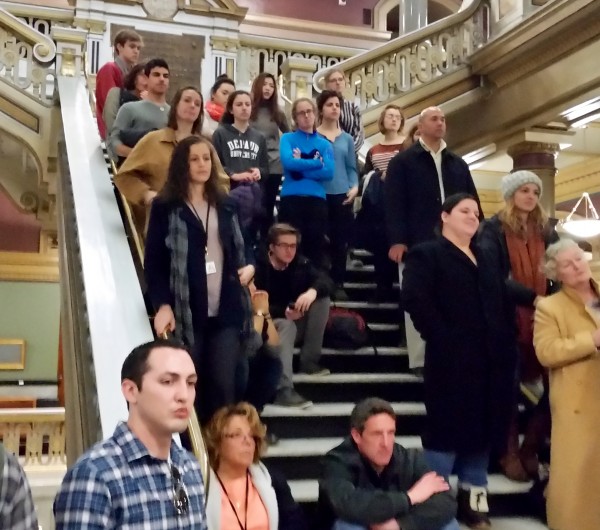 In the rotunda of City Hall advocates for the homeless gathered to release a new study validating the harassment and discrimination being felt on the streets and to demand that Mayor Elorza immediately instruct the Providence Police to stop their practice of criminalizing homelessness and harassing homeless individuals.
In the rotunda of City Hall advocates for the homeless gathered to release a new study validating the harassment and discrimination being felt on the streets and to demand that Mayor Elorza immediately instruct the Providence Police to stop their practice of criminalizing homelessness and harassing homeless individuals.
Back in August 2015, advocates held a rally in front of City Hall protesting the treatment of those experiencing homelessness in the city. They had found that with increasing frequency, people experiencing homelessness were being subjected to judicial and extrajudicial arrest, harassment, and discrimination. Additionally, they contended that individuals who were homeless were being treated as criminals for engaging in activities necessary to survival, foremost among them resting and sleeping.
Soon after the rally, in September, Mayor Jorge Elorza met with the advocates and declared that the harassment and discrimination happening was not in line with his Administration’s policy. At that time advocates asked him to make a public statement expressing that and to focus on solutions to homelessness rather than criminalizing the homeless. Fast-forward to now, four months later, and nothing has come out of the Mayor’s office.
To make matters worse for the Mayor’s office, advocates released results of a public spaces survey which show a clear and disturbing pattern of discrimination against those experiencing homelessness in downtown Providence.
“As an outreach worker I have both heard, and personally witnessed this kind of conduct, and it disgusts and enrages me,” said Megan Smith of House of Hope CDC.
“Essentially, only homeless people and formerly homeless people are being arrested for these activities,” said Dr. Eric Hirsch. The activities include, sitting, panhandling, standing, sleeping and talking, all of which are perfectly legal.
Eileen Boarman was homeless in Providence on and off for over two years. She has personally witnessed and been the victim of police harassment and abuse. She talks of being beaten, spray with water hoses, and having her arm twisted. She was treated as having no value and no rights. Her experiences are impossible to justify.
Several years ago, Providence City Councillor Mary Kay Harris and others spearheaded the creation of the Providence External Review Authority (PERA), a civilian lead police oversight board. In light of Dr. Hirsch’s findings, the re-establishment of this board in a must.
We need, says House of Hope CDC outreach worker Kate Miechkowski, “to address the cause of people having nowhere to go and nowhere to sleep, rather than arresting and harassing those who suffer from the effects of our failed economic policies.”
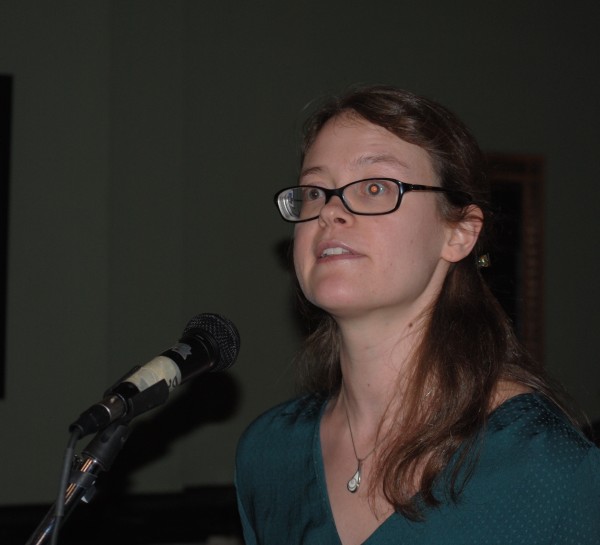
In November, Providence College students conducted a public spaces survey of random pedestrians in the Kennedy Plaza/Burnside Park areas of downtown Providence. The results were striking. Just over half (52%) of those surveyed were homeless or formerly homeless, but 95% of the citations and 94% of the arrests were experienced by homeless and formerly homeless persons.
Answers to other questions on the survey such as whether law enforcement had asked them to “move on” or to leave a particular area, how often they were asked for identification; and how often law enforcement searched their belongings without their permission show the same pattern of disproportionate harassment of homeless and formerly homeless persons by police. Other potential reasons for such targeting such as race, ethnicity, or age were not found to be relevant.

“It was stunning to see the degree to which homeless Rhode Islanders are subject to harassment by the Providence Police Department,” stated Dr. Eric Hirsch, Professor of Sociology and author of the Public Spaces Survey. “It was the only factor relevant to why someone was ticketed or arrested for everyday activities such as sitting, lying down, etc.”

Kate Miechkowski, Outreach Worker for the House of Hope CDC confirmed the findings of the survey stating, “This past summer and fall I had the opportunity to interview dozens of people experiencing homelessness about their interactions with Providence police officers. I was horrified by their experiences of degradation, humiliation, and blatant profiling. There was almost no one I spoke to who had amiable experiences with police officers. I personally witnessed multiple incidents in which people were told that they had to move for doing nothing except occupying a public sidewalk.”
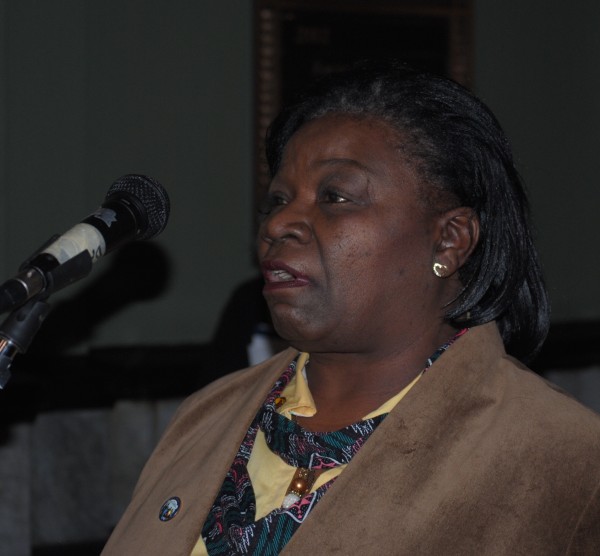
Advocates point to the fact that Rhode Island was the first state in the country to enact a “Homeless Bill of Rights” formally banning discrimination against Rhode Islanders experiencing homelessness and affirming their equal access to housing, employment and public services and believe the police’s targeting of people based on their housing status is illegal.
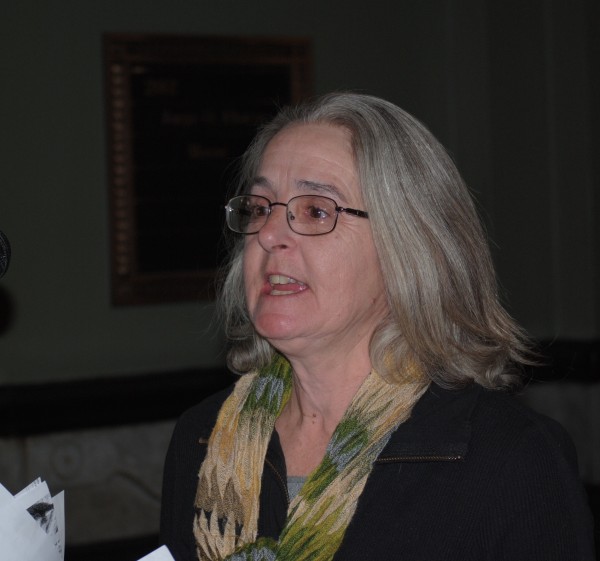
The Rhode Island law asserts that Rhode Islanders experiencing homelessness have the right to use public parks, public transportation and public buildings, “in the same manner as any other person and without discrimination on the basis of his or her housing status.”
In the original letter to the Mayor, advocates stated:
Criminalization is not a solution to homelessness. It is incredibly cruel to those experiencing homelessness, dehumanizing the individuals and making it harder to connect to advocates and services. It also costs the system more by spending taxpayer dollars on court costs and incarcerations rather than on housing, medical care, and other long-term solutions.
The group asked the Mayor to implement the following action steps to address the current situation:
1. Instruct the Providence Police Department that they may not order people to move from public property, nor threaten arrest for the failure to move, absent reasonable suspicion that they are committing a crime.
2. Ensure that this order is followed by:
a. Re-establishing the Providence External Review Authority (PERA);
b. Establishing a designated hotline to report harassment or illegal arrest and regularly reporting on calls received;
c. Adding content on Rhode Island’s Homeless Bill of Rights to the training police cadets receive at the Academy and incorporating this material into re-training of current officers.
3. Provide an appropriate location and budget for a day center in the City.
4. Publicly support the hundred million-dollar bond ask and ensure that the City’s programs to rehabilitate vacant homes (such as Every Home) results in apartments that are affordable to very low income renters.
Nationally, there is increasing recognition of the need for cities to shift away from criminalization and toward a right to housing. In its report No Safe Place, the National Law Center on Homelessness and Poverty details the ways in which criminalizing ordinances are damaging both to individuals experiencing homelessness and to the cities that enact them. It also found that, despite a lack of affordable housing and shelter space, cities across the country are essentially making it illegal to be homeless with laws that outlaw life-sustaining acts, such as eating and sleeping, in public spaces.
Key findings/conclusions from the report are:
- Homeless people are criminally punished for being in public even when they have no other alternatives;
- The criminalization of homelessness is increasing across the country;
- Criminalization laws violate the civil and human rights of homeless people;
- Criminalization laws are costly to taxpayers;
- Criminalization laws are ineffective; and
- Criminalization laws should be replaced with constructive solutions to ending homelessness.
The Seattle University School of Law recently published a series of briefs exploring the monetary costs of criminalization and placing these laws squarely within the shameful tradition of Jim Crow, Anti-Okie, and Ugly laws. Earlier this summer, the U.S. Department of Justice filed a Statement of Interest arguing that it unconstitutionally punishes homelessness to make it a crime for people to sleep in public when there is insufficient shelter.
Rhode Island’s Homeless Bill of Rights stands in complete contrast to this trend causing advocates to be dismayed by the growing complaints from those experiencing homelessness that the police are not respecting their rights.
The Homeless Bill of Rights sets an important foundation for Opening Doors Rhode Island, the state’s plan to end homelessness, which states as a core value that “there are no ‘homeless people,’ but rather people who have lost their homes who deserve to be treated with dignity and respect.”
Opening Doors Rhode Island outlines a plan that significantly transforms the provision of services to Rhode Islanders experiencing homelessness. Consistent with the new federal plan to end homelessness, the plan seeks to sharply decrease the numbers of people experiencing homelessness and the length of time people spend homeless.
“Rhode Island has the potential to be a model for how to end homelessness,” concluded Megan Smith, Outreach Worker for House of Hope CDC. “We can do this by collaborating to provide safe, affordable, permanent housing and engaging with and educating our community. It is not done by harassing and further marginalizing our city’s most vulnerable neighbors.”
Mayor Elorza was invited to speak at the rally, but declined. His office issued the following statement:
“The Mayor is committed to working with our service providers, advocates and community partners to address the social and economic challenges these resident face. We have spoken previously with the Chief of Police and he has directed his officers not to target those who are struggling with homelessness.”
[Portions of this are from a joint RICH and RIHAP press release]
]]>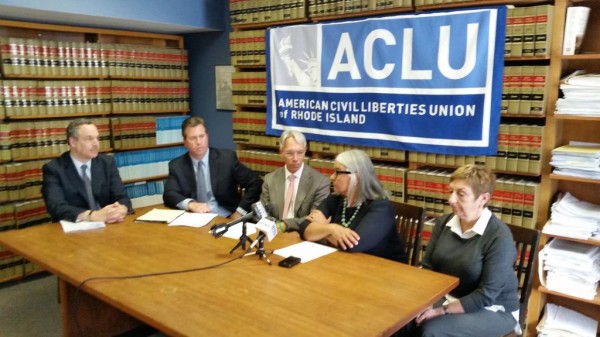 The American Civil Liberties Union of Rhode Island (ACLU) today filed a class action lawsuit in U.S. District Court to challenge the constitutionality of a recently enacted law that makes it a crime for certain sex offenders to reside within 1,000 feet of a school. As part of the suit, the ACLU has requested a restraining order to halt the law’s “inconsistent” and “arbitrary” implementation before any more individuals are uprooted or made homeless.
The American Civil Liberties Union of Rhode Island (ACLU) today filed a class action lawsuit in U.S. District Court to challenge the constitutionality of a recently enacted law that makes it a crime for certain sex offenders to reside within 1,000 feet of a school. As part of the suit, the ACLU has requested a restraining order to halt the law’s “inconsistent” and “arbitrary” implementation before any more individuals are uprooted or made homeless.
The new statute, passed overwhelmingly in the Rhode Island House of Representatives under the leadership of Speaker Nicholas Mattiello, is unconstitutional on three grounds, says Attorney John MacDonald, who filed the suit with Attorney Lynette Labringer today.
The statute is unconstitutionally vague, says MacDonald, with no definition of what constitutes a school in the law. Further, there are no guidelines offered as to how to measure the 1000 feet required under the mandate. Different law enforcement agencies use different systems operating under different parameters. A resident might be told he is safe by one agency, only to be ordered to move by another.
The law is unconstitutional because it violates due process. Level 3 sex offenders are banished from their property and their liberty under this statute, says MacDonald, and they have no recourse to a hearing unless they want to be arrested and charged in violation of the law.
The third constitutional violation occurs because under this statute, people who have already paid for their crimes are being further punished in having to move under threat of arrest.
The statute does not increase public safety, says MacDonald, and the homeless advocates in attendance at the press conference all agreed with this assessment. It is better to know where level 3 sex offenders are living, “but we have uprooted them and sent them to Harrington Hall, the only place that can house them.”
Jim Ryczek, who heads up the Rhode Island Coalition for the Homeless (RICH), is in full support of the lawsuit. “We are proud to have helped keep communities safe,” said Ryczek, adding that the three factors that keep people from re-offending are stable housing, employment and treatment. The law, if it is allowed to stand, threatens all three of these factors.
Not only is there no evidence that this law might help Rhode Islanders, this law “may have an opposite effect” says Ryczek.
Sol Rodriguez, executive director of OpenDoors, read her statement, saying, “People affected are being forced out of their apartments; some are homeowners, have families, are sick, disabled, and some live in nursing homes. Some are family caretakers. They have served the sentence imposed for their crimes and are known to law enforcement due to sex offender registry laws. This law will further destabilize this population.”
Jean M. Johnson is executive director of House of Hope CDC which manages Harrington Hall. Presently, this is the only facility that can house homeless, level 3 sex offenders in the state. During Wednesday night’s rain storm, “160 gentlemen inhabited Harrington Hall,” she said, “we are a 120 bed facility. We have always had level 1, 2 and 3 offenders stay with us. We are the shelter of last resort, we don’t turn anyone away.”
On Monday night, when the law is to be in full effect, 30 level 3 sex offenders could show up at Harrington Hall, in Speaker Mattiello’s district.
The new law, says Johnson, is “unjust and unfair.”
Beyond the issues of constitutionality and public safety, says Steve Brown, executive director of the RI ACLU, the law makes no sense. Many level 3 sex offenders were convicted for crimes against adults, and against adults they knew personally. These men are presently allowed to travel near and be around schools, but under the law are not allowed to keep in an apartment near a school, when the schools are empty.
As far as simply finding an apartment elsewhere, this is not really an option, said Jim Ryczek. Many landlords will not rent to a level 3 sex offender. Finding an affordable location that satisfies the 1000 feet limit in the amount of time available is all but impossible.
In Providence, 30 men have been told that they will have to move. A reporter at the press conference said that Speaker Mattiello was “getting pressure” to address the situation at Harrington Hall, but Jean Johnson said that no one from the Speaker’s office has reached out to her.
More information is available here.
]]>